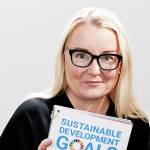The National Audit Office of Finland is currently chairing the WGEA - Working Group on Environmental Auditing.
The WGEA – working group is preparing its first longer-term strategy, extending to 2030. The strategy aims to identify emerging environmental risks and useful methods for auditors to approach them.
As background for the strategy work, we interviewed a broad range of international stakeholders from the World Bank and UN programmes to regional think tanks and non-governmental organizations.
The pandemic has turned the spotlight on green recovery and health issues
As a result of the pandemic, there are two issues in particular that are discussed around the world. A key role is played by the sustainability of the economic recovery packages and their ability to support climate and environmentally friendly investments. We do not afford to miss this opportunity.
Another issue discussed globally is ”One Health” and its sister concepts of planetary health and global health. They are based on the idea that the wellbeing of people and the wellbeing of nature are integral parts of each other: in the prevention of zoonoses, i.e. diseases transmissible from animals to humans, the key issues are the wellbeing of ecosystems and the sustainable use of the natural environment.
Policy coherence and systems thinking are highlighted
The interviews painted a picture of complex problems interconnecting different policy sectors and their dynamics. Another issue that was highlighted was the policy coherence between different environmental themes. For example, measures aimed at mitigating climate change might in some cases be harmful in view of biodiversity. In the financing of climate measures and the assessment of its efficiency and effectiveness, it would therefore be important to also consider the impacts of the measures on the loss of natural resources.
One of the keywords is “nexus areas”, i.e. the areas where different policy areas impact one another. Climate change, for example, is closely linked with energy, water issues, and land use. Examining these kinds of nexus areas makes it possible to address the truly difficult issues.
Such an approach requires auditors to have systems thinking and holistic thinking skills. More limited audits can also be conducted, but they will be more effective if they are based on a good general understanding of the wider picture and developments.
It is also important to address the mutual impacts of the UN SDGs
The need for a cross-sectoral approach also applies to the 17 UN Sustainable Development Goals (SDGs). The interviews showed that, in addition to examining the individual SDGs, there is a need for an overall view of the dynamics between the different SDGs.
On the other hand, the interviews also revealed concerns about addressing only the SDGs. This may mean that we close our eyes to some emerging risks and forget to look beyond the target year of 2030.
Futures thinking to inspire strategy work
The INTOSAI WGEA, chaired by the NAOF, worked on the strategy in its steering group meeting, organized as a series of video conferences, on 20–24 September.
The event was kicked off with an inspirational speech from Beris Gwynne, an Australian futures thinker who now works in Switzerland. She presented methods of futures studies and foresight in a situation where we are facing many global challenges. Gwynne’s speech is available for viewing online: Beris Gwynne inspirational speech on future foresight for environmental auditors – YouTube
Vivi Niemenmaa (NAOF) and Meeri Tarvainen
Meeri Tarvainen served as a trainee in the WGEA Secretariat in the summer of 2021.


